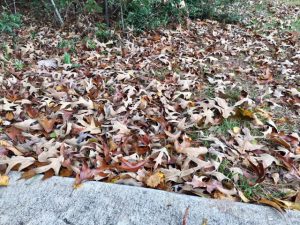Weed control is not top on my list as a reason to use mulch. There are weeds that can push through mulch such as nutsedge (nutgrass) or that can germinate and grow in the mulch. But done correctly, mulching plant beds and gardens can help inhibit some weeds. Tree leaves can be used as a mulch.
In addition to weed control, mulch provides other benefits. It can make landscapes look more attractive. It keeps roots evenly moist, acts to insulate roots from extreme heat and cold and can help decrease loss of soil from wind and water erosion. Mulch serves as a barrier to some soil-borne diseases, especially in the vegetable garden. And, as organic mulch breaks down, it improves the soil’s fertility, aeration, structure and drainage.
Tree leaves make good mulch. They can be placed on the soil surface beneath and around shrubs, trees, perennials, annuals and vegetables.
Fall leaves are abundant. Some people feel overwhelmed by the volume. One resident reported raking more than 100 large bags of leaves from his half-acre property. One large oak tree can contain over 250,000 leaves!
Tree leaves can be placed in landscape beds or around vegetables “as is” or chopped up with a shredder or mower into smaller pieces and then spread around vegetables, shrubs and trees. Mixing leaves from several different species of trees can make better leaf mulch. Leaves of the same size tend to mat together and produce a shingling effect that can shed water and reduce gas exchange in the soil. Shredded leaves stay seated better on the landscape than whole leaves.
A mulch layer three inches deep after settling is enough for most plants. If possible, extend the mulched areas out to the outermost leaves (called the drip line) and beyond. And be sure to pull the mulch back a few inches from the main trunk. Never pile mulch around the trunk.
Using those fallen tree leaves as mulch recycles a natural resource and saves you money, enriches your soil, fertilizes your plants and keeps them out of the local landfill.
So, instead of putting all those leaves curbside in plastic bags to be hauled off, use them to benefit your landscape, which may include less weeds.
For additional information on landscape/garden mulch, contact the UF/IFAS Extension Office in your County or access the following sites.
http://gardeningsolutions.ifas.ufl.edu/care/planting/mulch.html
http://edis.ifas.ufl.edu/topic_mulch
- Nuisance Gnats abound in Northwest Florida this spring - June 26, 2025
- Watering to Establish a New Lawn - May 15, 2025
- Sweet Onion and Strawberry Success, a Matter of Variety and Timing - April 10, 2025

